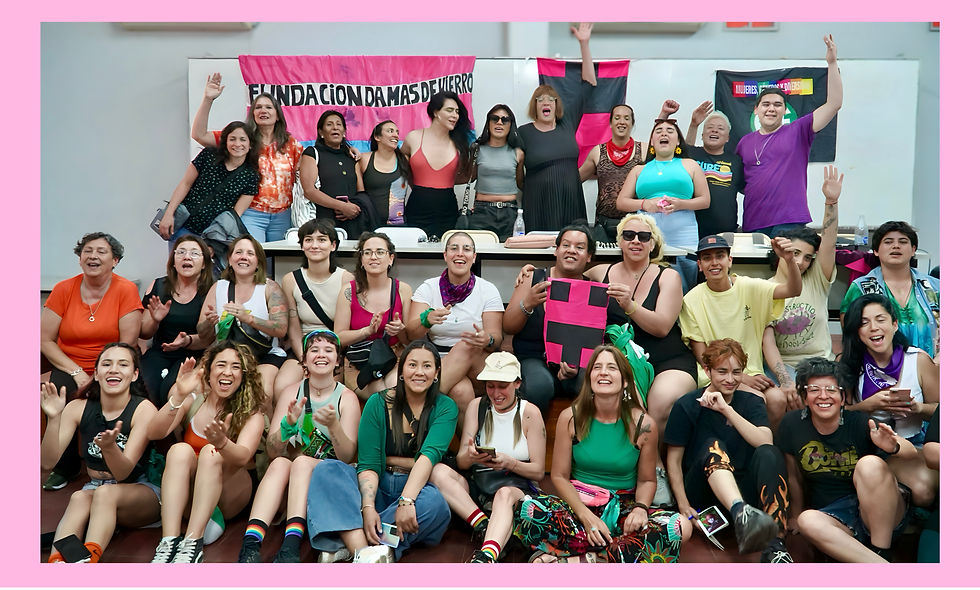Human Rights and Reparations from within Travesti Perspectives
- PJ DiPietro
- May 4, 2025
- 4 min read
Updated: Jun 8, 2025
A workshop addressing the need for reparations for the travesti community in Argentina took place on October 11 and 12, 2024, in San Salvador de Jujuy, as part of the community-proposed activities at the 37 Plurinational Encounter of Women, Lesbian, Trans, Travesti, Bisexual, Intersex, and Non-Binary People. Approximately 170 attendees participated in this workshop, which was co-led by Marlene Wayar and PJ DiPietro. We shared the conclusions developed over two sessions of 2 hours each at the closing plenary session.

The workshop reflected on the situation faced by travesti/trans and non-binary people, compañeras and compañeres. The participants decided to speak with the “we” personal pronoun, marking the collective spirit of the analysis and claims.
We see ourselves as a people threatened by abandonment and neglect. We are part of a people at the crossroads of multiple intersections because we do not only present beyond the male/female binary but also because we belong in Indigenous worlds, brown worlds, working class worlds, unemployed and disabled worlds, and the worlds of youth and elderly people. We are the T people, and we are seeking a territory where we can live with respect, dignity, and physical, mental, and spiritual health.
The travesti/trans community lives in condition of precarity and vulnerability. What we have in common is the experience of being treated as trash. As kids and teenagers, we are subjected to sexual exploitation. We are squeezed to quench a cisheterosexist world’s thirst. In adulthood, our suffering and erasure bring pleasure to a hateful and hostile world.
Our bodies have been used as laboratories by schools, doctors, governments, families, and churches. The state has sponsored and authorized an objectification of our bodies. We are laboratories of discipline, regulation, and control, allowing an institution such as the nuclear, white supremacist, heterocissexist, and ableist family perpetuate itself. Our subjection to discipline intertwines with a capitalist model of being and consuming.
The travesti/trans people belong to a country without childhood. We are forced to grow up quickly, expelled from all institutions that are supposed to care for and help us. The state owes our people a debt that is both unsurmountable and irreparable. It turns us into “sewer identities” like the late Lohana Berkins taught us. The state ignores the fact that some compañeras have been abused and subjected to human trafficking from an early age.
When analyzing our sewage identities, we document both the individual and collective aspects of the hateful violence we face. That is why we speak of travesticides and genocides. The idea of genocide allows us to explain the systemic nature of the violences, persecutions, and damages against the T population.
As a peoplehood, a weness, we exercise our autonomy and demand from all of you a historical reparation, recognizing the social debt that the State and society owe to our people. To do so, we propose reparative measures, consisting of an individual restitution or compensation and a general component in the form of travesti-phobia prevention training and education. The T people demands compensation for every case in which travesticide is documented as a manifestation of economic, social, political, cultural, and emotional violence and harm. Compensations must be accompanied by educational training, preventing damage and suffering to recur.
We ask that each member of society, both individually and collectively, takes responsibility for their deeds and misdeeds, for their actions and omissions, concerning respect, dignity, and wellbeing in the lives of our T peoples.
We seek to participate in this process by raising awareness and creating accountability benchmarks with the goal of having the T country accessing:
Collective memories that recuperate and safeguard the life stories of fellow travesti/trans and non-binary kinspeople.
Healthcare that provides for dignified care and solidarity, where integrative approaches are routine rather than a friendly exception.
Comprehensive healthcare to prevent the death of our kinspeople due to neglect, fear, poor customer service, or mistreatment.
An affirming care approach that respects self-identification and autonomy among nonbinary individuals without imposing Western-centered stereotypes of beauty and transitioning.
Name change regulations that bear legitimacy across all databases and institutions, such as high school diploma records, university registrar’s offices, and in hospitals and clinics’ datasets.
Name change policies established at the federal and state levels, securing self-identifying rights for migrants who should be welcomed and respected.
Labor quota legislation establishing hiring criteria that follow the community’s advice, which will add transparency to human relations in the workplace both in public and private sectors.
Labor quota legislation safeguarding retention.
Housing policies centering various kinship models, emphasizing multiple arrangements about mothering, fathering, gestation, and community regeneration.
Community building policies providing a caring horizon for futurities and youth, where everyone has access to the resources necessary to organically come to their own voices and political representation.
Education politics centered on the voices, wisdom, and ancestral knowledge of our T community, sustaining the growth of an ancestral community whose members reach full lives without distortion or thingification.
Plural, expansive, and heterogeneous communities whose awareness will lead us to question our own rigidity and ignorance.
Diverging perspectives about the condition and situation of sex work, allowing for tension among these perspectives to nourish each other. First, we need to remove the police from spaces where T people practice sex work. Second, we aim to model attentive and respectful listening, considering both the similarities and divergences between abolitionism, prohibitionism, and regulation. Third, we ask that we do not romanticize sex work, that we pay attention to the serious issues of human trafficking and child abuse, and that we understand that sex work takes place across multiple contexts and, often, is linked to self-affirmation, financial autonomy, and pleasure.
Finally, we ask that at this gathering we each ask ourselves if and to what extent do we owe reparations to travesti/trans populations.

Comments